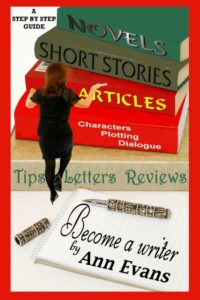Ann Evans: Hints & Tips For New Writers #5
25 August 2020

Writers are always being told to ‘write about what you know’. But I’ve always thought that if we stuck too rigidly to that idea, we’d never write anything. I’m more of the opinion that we should write about what interest us – or better still, what excites us! And if you don’t know anything about it, that’s the time to do some research.
That’s also the time to look inward to our own personal experiences and see what can be drawn on to help us write those scenes with clarity. Say for example your romance sees the heroine being whisked away across the burning sands by an Arabian Prince on a charging white stallion. Well we’ve all experience that, haven’t we? Er…no, probably not!
But I bet most of us have been pony trekking – or had a ride along Blackpool beach on a pony or donkey as a child. You might not immediately see the connection, but don’t you remember feeling the strength and solidness of the animal beneath you. The fact that it’s in charge and you’re just hanging on. Do you remember its warmth, its movement, your own excitement? And I imagine most of us have experienced sand that burns your feet whilst on holiday. So, we draw on our experiences, take what we can from them, combine reality with imagination. Do that and you’ll soon find yourself writing with confidence and conviction.
In my historical romance, A Place to Belong, my heroine, Lily Baines has often wondered what it would be like to ride on a horse, and upon meeting our hero, she gets that chance – to ride on a huge Shire horse. My memories flew back to a Spanish holiday and pony trekking. I remembered a huge horse called Thunder who was slow and plodding and gentle. I snaffled that memory for the scene in my book, I called my fictional horse Thunder too. The truth was, my (then) husband actually got to ride that horse, I got the one that bit and kicked and deliberately trotted under a low branch before finally dislodging me by rolling over. But that’s another story!
We all know our stories need conflict, so our protagonist needs to have all sorts of problems and difficulties to overcome. When plotting your story you might want to think of what frightens you. There’s nothing wrong with letting your hero or heroine suffer from the same fears as you do. I’m not too good with heights and sheer drops, and this has come in useful in probably three or four different scenarios where my heroines have had to cope with such nerve-wracking situations.
Your own experiences come into play regardless of what you’re writing – descriptions of places. Use a little bit of one place, incorporate the furnishings of another, the garden of somewhere else and so on. A derelict house that inspired my children’s book, Disaster Bay, also turned up in Kill or Die. In both books the house gets totally destroyed, but like the Phoenix, rises from the ashes ready for the next set of characters to get to know it. And that’s the nice thing about drawing on our experiences, they never diminish, and we add to them all the time.
When creating characters it helps – in a way, to draw on our experience, but oddly enough, I would say be very wary. If you’re using someone close to you, chances are they will recognise themselves. Years ago I wrote a story for Scholastic’s 13 Murder Mysteries. My husband read the book and immediately said, “What’s your mum doing in here?”
But that’s actually not the reason it’s best not to draw too closely on people we know. If your character is based on a friend or relative, it’s going to hinder your story telling. You won’t want that character to face misfortune and danger or sickness. If it’s your mum, your aunty or your best friend, you only want the best for them. So placing them in precarious situations is going to be difficult. Also, when creating a character you need to know everything about them – absolutely everything. And no matter how well you know your friend or relative, you won’t know their innermost thoughts or hopes and dreams. So once again, you’re giving yourself unnecessary problems.
However, I do think that if you’re creating a character that has a particular profession, it’s definitely worth listening closely to what they say regarding their work. Take note of the phrasing, the jargon, the technicalities – make notes, ask questions. So when your hero or heroine is talking about their work it will sound true to life. In Champagne Harvest, my hero had a Champagne vineyard, producing his own brand of Champagne. I found I could write about him with confidence. The reason being, a few years previously, I’d gone on a press trip to the Champagne region. I wrote copious amounts of notes and articles – so when it came to writing this book, everything my hero said (in connection with his vines and Champagne) I’d plucked from my notes – genuine phrases spoken with passion by the real growers in the Champagne Region.
Of course you have to select what they say carefully, you don’t want your story to sound like an instruction manual! It’s a fine line between incorporating reality with fiction – you need just enough genuine detail to make your story believable.
We’ve all experienced standing on a train station platform and seeing the train come into view, how the air changes as it approaches, particularly in the underground. We’ve experienced the sounds, the power, the danger… All this came into play when I wrote a short story called, End of the Line. I read it out at my local writers’ group one evening. It told of a woman convinced her husband and his secretary who are about to board the train are actually running away together. Told in the first person, the wife is frantic, she’s begging him not to go. He tells her to stop acting crazy and he and his secretary are not about to miss this train. They step forward. At the last second, as the train surges along the platform’s edge, the wife agrees with him, they won’t miss the train – the almighty push she gives them makes sure of that.
I remember the wide-eyed question of a new member of the group as she turned and asked in all seriousness: “Did you really do that? Did you really push them?”
Job done! I must have used enough real life experience blended with the fiction to make it convincing. And perhaps that’s the trick – merging the two together so no one can see the join.
A few tips in a nutshell:
- Get into the habit of writing down your feelings regarding different emotions in different situations, good and bad.
- Think about what really frightens you – handy when you want to pile on the agony for your protagonist.
- Think of the major emotional events in your life. Make notes.
- When you are drawing on specific information that you know to be true, be careful not to use too much, or it will look like you’ve lifted it from a textbook. Keep true to how that character would normally speak. Allow the other characters to interject with remarks or questions so it comes across as dialogue.
- Think about the professions of the people around you. Consider how you could use their experiences in your stories.
- Make notes of how experts speak – their phrases, their outlook on different situations. Keep snippets of conversation that may come in useful. Use documentaries and YouTube to top up your knowledge.
- Have confidence in your own experiences of places and situations, and make use of them when writing your fiction.
- Whatever you’re writing, look to your own experiences and don’t be afraid to draw on them when you need to.
Happy writing and stay safe everyone.
Ann

Ann Evans writes romance under the name of Ann Carroll, she also writes thrillers, books for children, YA and reluctant readers. She is also a freelance feature writer for various magazines.
Website: www.annevansbooks.co.uk
Facebook: https://www.facebook.com/annevansbooks/
Twitter: https://twitter.com/annevansauthor

Find more writing tips in Ann Evans’ book, Become a Writer – a step by step guide.
https://amzn.to/3487fws



